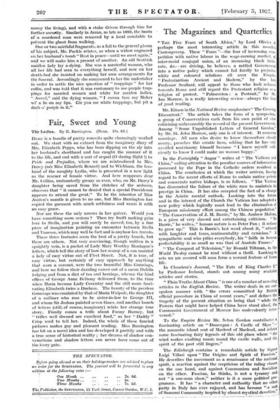Fair, Sweet and Young
Vie Ladles. By E. Barrington. (Bean. 10s. 6d.)
HERE is a bundle of pretty conceits quite charmingly worked out. We start with an extract from the imaginary diary of Mrs. Elizabeth Pcpys, who has been dipping on the sly into her husband's shorthand and has caught the manner of it to the life, and end with a sort of sequel (0 daring flight !) to Pride and Prejudice, where we are reintroduced tci Mrs. Darcy (nee Miss Elizabeth Bennet) and to Wickham, the hus- band of the naughty Lydia, who is presented in a new light as the rescuer of female virtue. And here reappears dear Mr. Collins, undauntedly greasy as ever, who, on Mr. Darcy's daughter being saved from the clutches of the seducer, observes that "it cannot be denied that a special Providence appears to attend the great." To be the inheritor of Miss Austen's mantle is given to no one, but Miss Barrington has copied the garment with Much artfulness and wears it with an easy grace. Nor arc these the only arrows in her quiver. Would you have something more serious? Then try Swift making grim love to Stella, and you will surely be moved, too, by a fine piece of imagination painting an encounter between Stella and Vanessa, which may well be fact and is anyhow ben trorato.
These three fantasies seem the best of a pretty bunch, but there are others. Not very convincing, though written in a sprightly vein, is a packet of Lady Mary Wortley Montague's letters, which tell the story of how her scamp of a son married a lady of easy virtue out of Fleet Street. Not, it is true, of caiy virtue, but certainly of easy approach by anything that wore a coronet, were the two beautiful Miss Gunnings, and here we follow their dazzling career out of a mean Dublin lodging and from a diet of tea and herrings, whence the kind offices of George Anne Bellamy delivered them, to the time when Maria became Lady Coventry and the still more fasei- :rating Elizabeth twice a Duchess. The beauty of the peerless Gurinings was emulated by that of Maria Walpole, the daughter of 'a milliner who rose to be sister-in-law to George III, and whom Sir Joshua painted seven times, and another bunch of -letters (still, of course, imaginary) relate her strange true story. Finally comes a trifle about Fanny Burney, but "trifles well dressed are excellent food," as her " Daddy " CriSp used to tell her. Indeed, the whole of these fancied pictures makes gay and pleasant reading. Miss Barrington has hit on a novel idea and has developed it prettily and with a true sense of historical reality ; her dreams of shadow con- versations and shadow letters can never have come out of the ivory gate.


























































 Previous page
Previous page